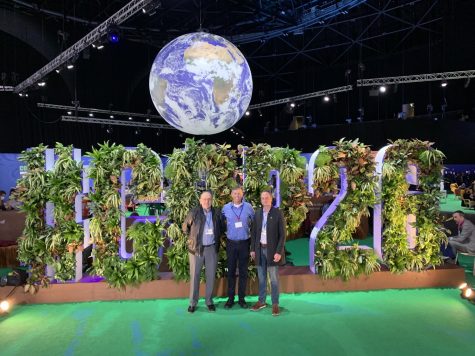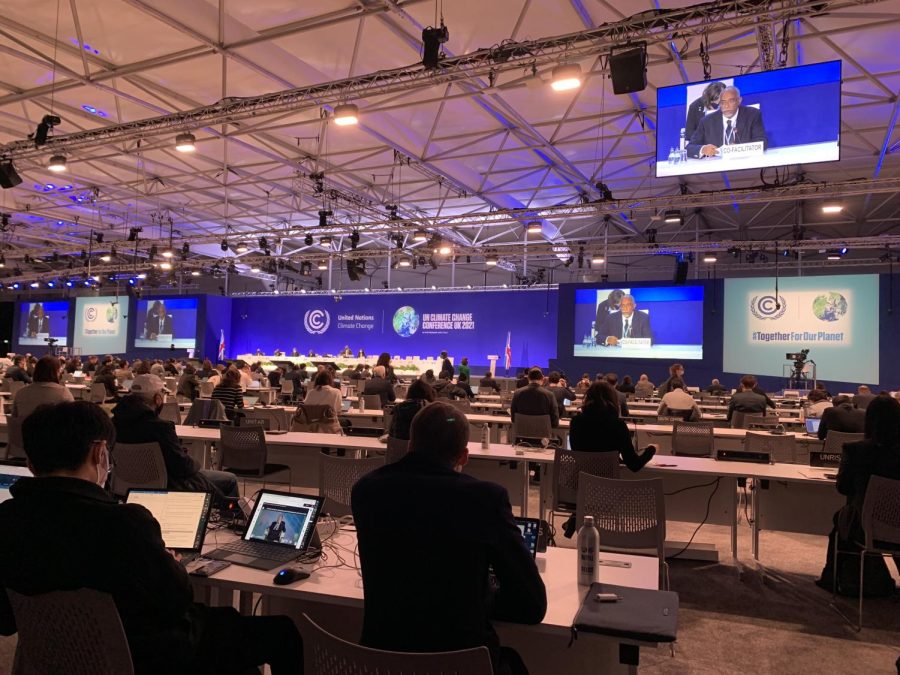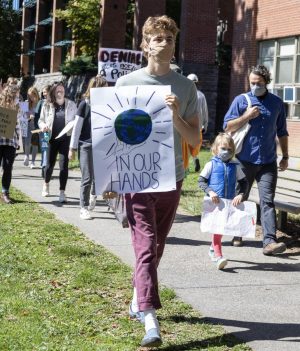App State faculty attends 26th annual U.N. climate change conference
Attendees sit in for a panelist session and listen to facilitators at COP26.
November 29, 2021
Three App State faculty members attended the 26th annual United Nations climate change conference, also known as COP26, which was held in Glasgow, Scotland, Oct. 31 through Nov. 13.

The members in attendance were Lee Ball, the university’s chief sustainability officer; Dave McEvoy, the university’s chair of the department of economics; and Martin Meznar, the university’s associate dean of global and civic engagements.
The purpose of the conference was to “bring parties together to accelerate action towards the goals of the Paris Agreement and the U.N. Framework Convention on Climate Change,” according to the U.N. Climate Change Conference’s website.
In 2019, McEvoy submitted an application on behalf of the university to be considered as an observer institution. Non-governmental organizations must be admitted to the Conference of the Parties as an observer organization to the U.N. Framework Convention on Climate Change before representatives gain admission to the sessions.
App State officially earned the title of observer institution two years after the initial application was submitted.
In addition to world leaders, including President Joe Biden, who gave a speech during the opening session, 197 nations attended the conference. People also protested outside the conference demanding a quicker resolution to climate issues.
Martin Meznar explained there were many different sessions attendees were able to observe.
Meznar said the entire experience was eye-opening because of the sudden realization of how complicated dealing with climate issues can be, especially on a global scale.
“There was a wide array of very important climate-related issues, but the importance was not consistent across all the countries. Different countries had different priorities,” Meznar said.
Lee Ball explained there was a point where all of the countries realized the urgency and importance of fixing the climate crisis and that they needed to actually work together in order to come up with a plan to fix it.
“If we don’t work together, the climate emergency is going to just get worse, and the effects of that are going to be astronomical, both for people and for the planet,” Ball said.
There were disagreements among the countries, such as deciding to reduce or completely stop using fossil fuels. However, the parties collectively came up with a common goal to phase down the use of fossil fuels in each country, as well as some other goals which are stated on their website, such as protecting and restoring ecosystems and speeding up the switch to electric vehicles.
Ball said App State plans to incorporate the goals of the conference on campus by decarbonizing transportation, adding more electric vehicles and encouraging driving less, as well as decarbonizing App State’s steam plant more swiftly.
“We can’t afford to play Russian roulette with the planet,” Ball said.
McEvoy noted that in his experience on campus, students appear to be active in combating climate issues. He said this may be due to the university’s strong sustainability focus.
“To help solve this climate crisis, it takes an individual focus in changing your own life. I think that App State students have an appreciation for that. This is an opportunity to see how those things work in conjunction to high level policy and regulation,” McEvoy said.
Depending on the location of the international negotiations, the university may be eligible to send delegates again. Next year’s U.N. climate change conference will be held in Sharm El-Sheikh, Egypt.
“It would be life-changing for students to have a chance to be a part of that and really see the magnitude of the problem,” McEvoy said.
















MuChao • Dec 7, 2021 at 8:24 am
Meanwhile, back at home, App administration celebrates transitioning to 15% of electricity via hydro beginning in Jan. While this is fine and dandy, what they try to downplay is:
1) This does not add *any* new renewable electricity to the grid, it merely increases the amount of electricity purchased via renewable sources, in this case, pre-existing hydro. i.e. this does absolutely nothing to help reduce CO2 emissions.
2) The cost for this transition is $150k/year in added fees. Of that, $50k is being provided via the Renewable Energy Initiative, a student-led organization, funded by *voluntary* student fees. That said, this goes against the very foundation of the organization, which exists to give students an opportunity to design, build and fund RE projects ON CAMPUS. Not simply to hand over hard-earned student dollars to the university’s own utility!! Frankly, this is an insult to the students who have contributed to REI’s years of awesome work on campus.
3) The university has only agreed to this new hydro power purchase for ONE YEAR. That’s all. That’s not a commitment to sustainability.
4) That $150k might seem like a lot, but here’s some important perspective that no one seems to want to talk about: The university could, on Jan. 1st, move to 100% renewable electricity immediately. The total cost would be ~$1 million. Now the perspective: That one million is only 4% (FOUR PERCENT!) of the ANNUAL LOSSES incurred by Athletics. Athletics flushes $25 million down the drain Every. Single. Year. And these losses are fully subsidized on the backs of students. Ever wonder why on your student fee receipt you pay over $1000/year to fund Athletics? (it’s about ~100x the rate that the Renewable Energy Initiative is funded…)
So let me repeat that. For university that is constantly pretending to be more sustainable than it really is, which has thrown that term around so much that it’s lost all meaning, for the low price of just 4% of the annual Athletic LOSSES, AppState could immediately move to 100% renewable electricity. Please let that sink in for a moment…
So it’s not that App can’t do it. It’s that App won’t do it. “Sustainability is not a trend, [NOR!] is it a tradition…” …it’s just a buzzword to try and bring in more students and increase growth. Greenwashing, through and through.